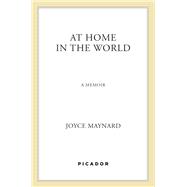At Home in the World
, by Joyce Maynard- ISBN: 9780312195564 | 0312195567
- Cover: Nonspecific Binding
- Copyright: 4/1/2010
The house where I grew up, in Durham, New Hampshire, is the only one on the street with a fence surrounding it. That fit. Our family--my mother, my father, my older sister, Rona, and I--never belonged in that town. Or anywhere else, it seemed to me, but in that house, with one another, like a country unto ourselves, a tiny principality with a population of four. Arguably three, since my sister tried to remove herself as much as possible. There was a phrase we used in our family: "one of us." We didn''t use it often, but what it meant was that we'd encountered a person who might get inside the fence and enter the fortress of our family. No one ever did, fully. The only ones who were truly "one of us" were ourselves. My father comes into my room just after six every morning and wakes me with the snap of my window blinds. "Time to get up, chum," he says. Four decades since he lived there last, you can still hear England in his voice. Years later, when I'm in my thirties and beyond, and he's long dead, I will sometimes be at a movie and Sir John Gielgud appears on the screen, and, though he looks nothing like my father, the sound of his voice will be enough to make me cry. There's no unkindness in the way my father wakes me. He simply believes it's anunconscionable waste to stay in bed when the sun is shining. Or even if it's not. My whole life, I have been unable to sleep late. Every morning, my father brings my mother coffee in bed, then comes back down to make his breakfast. He'll be eating it when I come down the stairs. Porridge, maybe, or an egg. He always reads while he eats breakfast. It might be the letters of Harold Nicolson, or the journals of Simone Weil. Although he knows Paradise Lost by heart--eighteenth-century literature is his field of specialty, and he teaches it at the University of New Hampshire--he may still read over a passage from Milton that he'll be lecturing on today. Sometimes my father will read the Bible at breakfast--another book he knows well. My father's parents were British Fundamentalist missionaries who left the Salvation Army because of its excessively liberal teachings to join a sect known as the Plymouth Brethren. The second to last of their seven children, my father, Max Maynard, was born sometime around the year 1900, in India, where his parents had come to proselytize. Of the many mysteries that surround my father's family, the first concerned the date of his birth. He claimed his parents told him they were so occupied with the Lord they hadn't written it down. I never met my father's parents, or any parents so consumed with God that they'd forget the year of their child's birth. If nothing else, the story told me something about my father's perception of them. As a small child, my father had loved to act and sing, but his deepest passion was for painting. He had known for a long time that he wanted to make art, but hadn't dared ask his parents for paints. When he was ten, he finally got himself a paintbox, which became his most treasured possession. He painted and read constantly, and with so much reckless abandon that he broke the inviolate rule of his household, to observe the Sabbath with no activity but reading of the scripture. His older brother saw him painting and reported the news to their parents. His father called him to his study. "Bring me your paints," he said, and when my father delivered them, his father placed them in his desk drawer and slammed it shut."For one year, Max, you shall not paint," he said. My father broke with the church and with most of his family when he was a young man, having emigrated from England by now and settled in British Columbia. While most of his brothers and sisters pursued a life within the church--one, Theodore Maynard, becoming a moderately well-known Catholic theologian--my father took up with a group of early modern artists in Victoria who were regarded as a radical bunch. One, a much older woman painter named Emily Carr, would become the men






